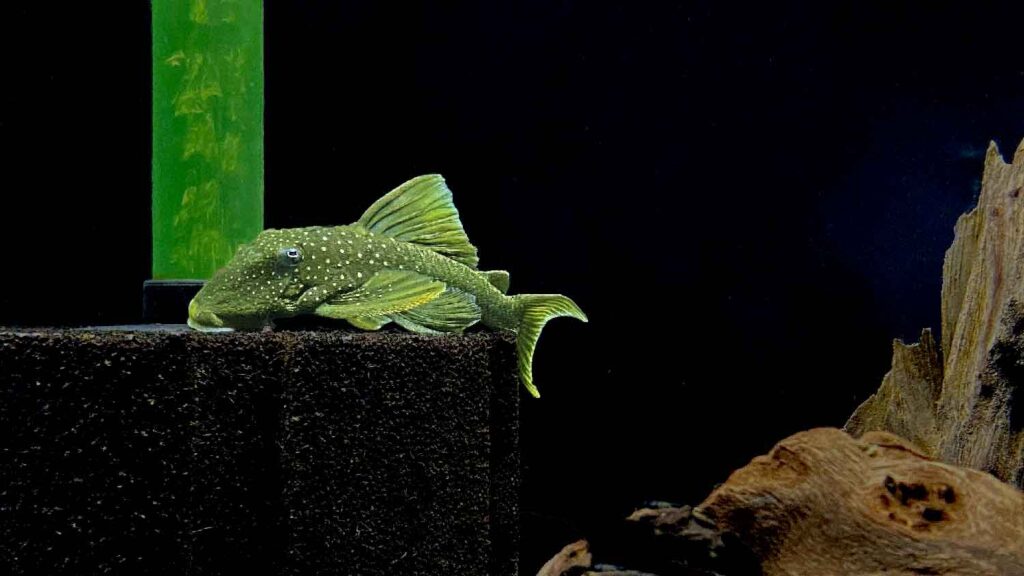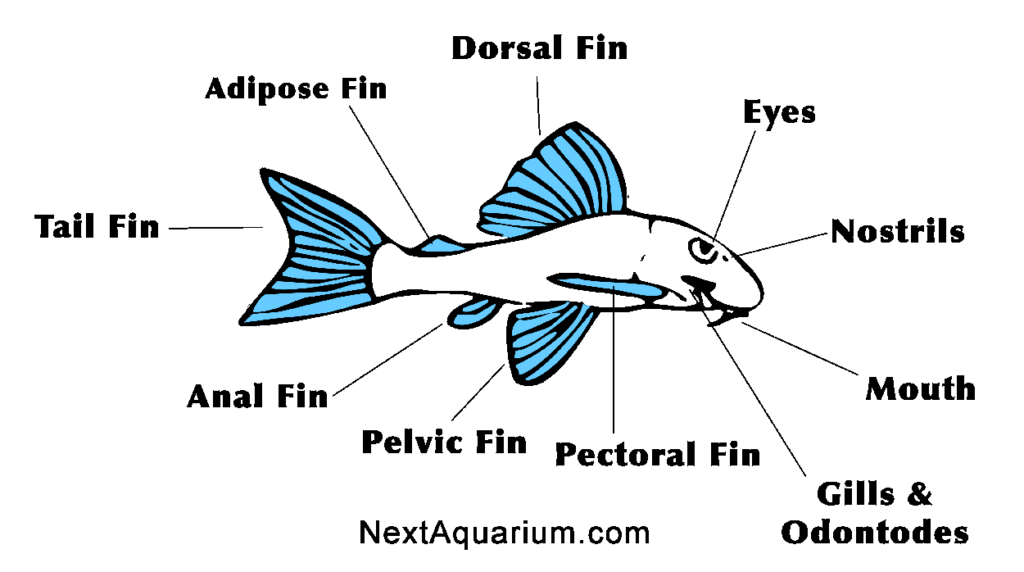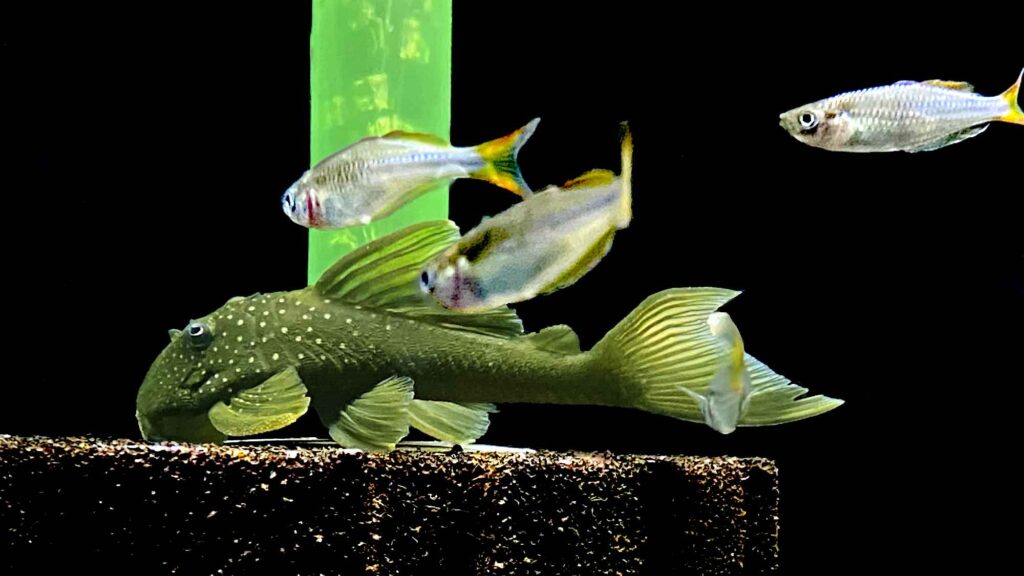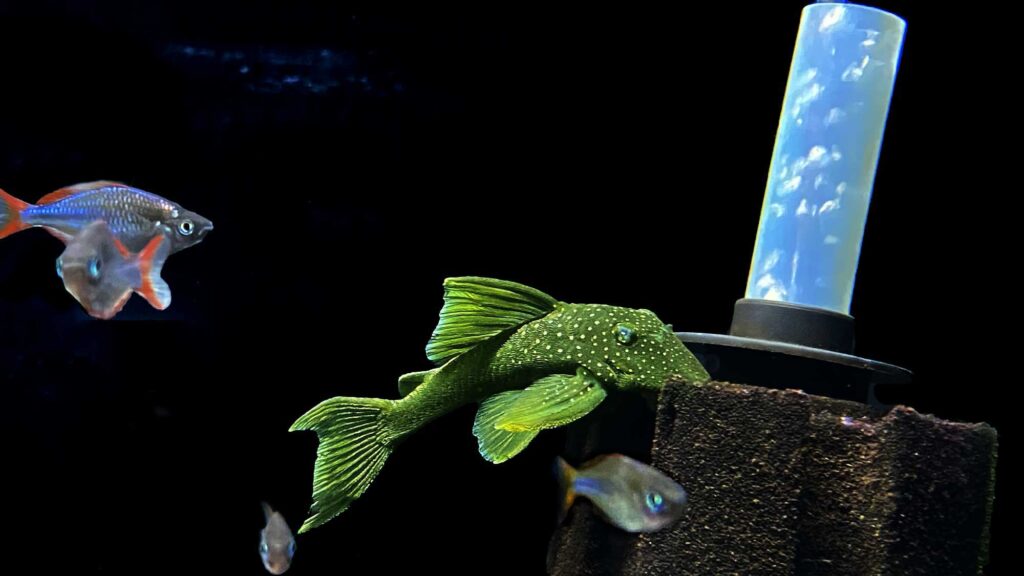Green Phantom Pleco (Hemiancistrus subviridis) is an interesting freshwater fish that is kept by many aquarium owners. They are attractive-looking fish and are fairly peaceful. They don’t have complex care requirements and can easily live in your tank. Their size makes them a preferred pleco choice for most aquarists. The L200 Pleco will need specific tank conditions to thrive and happily live for many years.
This article will guide you through the essential information about Green Phantom Pleco care. We will also provide a bunch of other useful tips and tricks to make you an expert in caring for this fish.
Species Profile & Overview
Green Phantom Pleco ( L200 Pleco ) is a member of the Loricariidae family (plecos) that comes from Rio Orinoco in Venezuela. These fish have been in the aquarium hobby for many years and have been bred in captivity by aquarists. But the majority of the L200s available in the pet trade are coming directly from the wild.
Also known as L200 Pleco, these fish have a bony body that has bright yellowish green dots on the head and their back but not on the tail area. In the wild, their boney back and their unique colorations will help them protect and camouflage from predators that swim in the area. These fish are not always available in pet stores compared to other types of plecos. This makes them quite pricey compared to more regular types of plecos.
Unlike aquarium environments, in their natural habitat, these fish have very low visibility in the water. Water is warm and filled with organic plant matter that many small creatures feed on. The Green Phantom Pleco usually feeds on vegetation and other available food sources. Like all catfish, They are hardy and can tolerate different water conditions.
Same as in their natural habitat, you will need to furnish the aquarium with driftwood, rocks, plants, hiding spots, and a diet of vegetables and small crustaceans. This is to ensure they live a happy and healthy life in your tank.
Appearance:

The appearance of the Green Phantom Pleco is unique and beautiful. Their unique color and markings makes them stand out in your aquarium and will grab any viewer’s attention.
Like other pleco fish, they do not have scales, instead they are covered with hard bone plates on their back. The belly area is very soft with a thin layer of skin. Eyes are located on the head and are the only soft spot they have on their back.

As seen in the figure above, these fish have 8 fins that are used for swimming. The fins are large and triangular-shaped that are fan backward.
Their unique green and yellowish color make them stay apart from the other Loricariidae fish. As the name suggests, the base color on their body is green that becomes yellowish as it spreads towards fins. They also have bright yellow dots on their body that makes them even more beautiful. These dots are mainly on the head and below the dorsal fin. But the rest of the body, including the belly area, is usually light yellow with no visible dots.
Setting up your tanks as close to what these fish get in nature will increase the contrast and coloration of your L200 Pleco.
Adult Size
The average Green Phantom Pleco size is about 6 inches when they are fully grown. Compared to other types of plecos they are slightly bigger which make them a good fit for medium and larger aquariums.
If they receive adequate care in their early stages of life, and when they are young, they will grow to their maximum size effortlessly and quickly.
Lifespan
In captivity, Blue Phantom Pleco’s lifespan is around 10 – 15 years. However, there are reports that some individual specimen has lived even longer.
To ensure your fish live their full expected life you will need to provide them the care recommended in this article and include proper maintenance and diet.
Behavior and Temperament
Green Phantom Pleco has an incredibly peaceful character that makes them a superb addition to any aquarium. Most of the time they are calm and stay in their own small territory at the bottom of the tank. They are primarily active during the night and will look for available food and stay in their cave during the day.
That being said, they will also come out during the day when they are hungry but feel safe. They are food motivated creatures and if your tank setup is night they will swim around at all times.
When you keep multiple males in an aquarium, you might see them getting a little aggressive. They show aggressive behaviors when they are fully grown adults. This aggression can occur towards other male L200 or even other bottom-dweller fish.
Adding more hiding areas and more pleco caves will prevent aggressive behaviors among males. You should have at least one cave for each male present in your tank. The other way to prevent aggression is to simply keep all females, if it’s a possibility to have them sexed before purchasing.
Green Phantom Pleco Care
Green Phantom Pleco care is easy and many consider these fish as one of the easier pleco species to keep. Any hobbyist can keep this fish when they provide them with the right setup and water parameters.
They’re a peaceful species that will mind their own business without demanding a lot of attention. When they get clean water and a rich diet, they will live happily in the aquarium.
To provide the best possible living space and care for your Green Phantom Pleco, you should follow the basic recommendations listed below.

Tank Size
An adult Green Phantom Pleco will need a tank size of at least 30 gallons. Juveniles can live in smaller aquariums but you will have to upgrade once they grow. We always recommend getting the biggest fish aquarium that you can possibly afford. This makes life easier for you and the fish living in it.
If you are planning to keep more than one of the L200 Plecos then you should get a bigger tank. These freshwater fish need ample bottom space so the gallon that your aquarium can hold might not always be the best way to calculate how many plecos you can keep in your aquarium.
For L200 Plecos a wide tank is preferable over a tall tank. This is because high tanks have a smaller floor area than low aquariums of equal volume. Both tanks hold the same amount of water, but the high tank can house fewer plecos due to its narrower floor area. After choosing a suitable aquarium for your setup, you can add slates, rocks, tiles, and other decorations to give your Green Phantom Pleco even more floor surfaces.
Tank Setup:
When it comes to plecos, the tank setup is super important. These fish are shy and nocturnal and will need specific items in the aquarium. Green Phantom Pleco spends most of its time swimming at the bottom of the tank and around decorations. This means you will need to pay attention to the items you put in your aquarium.
They need lots of hiding spots to feel safe in your aquarium. You can create these hiding spots by adding lots of rocks and driftwoods to your tank. During the day, they will hide in the shadows and crevasses created by the decorations; however, they feel safest in a pleco cave. These caves are specially made for plecos and will provide a dark space for the fish to rest during the daytime.
Because of their soft belly, these fish need a soft and fine substrate. The rivers these fish are coming from have fine sandy and muddy substrate. In an aquarium, sand is the best substrate for Green Phantom Plecos, however, if you have live plants in your tank, which we highly recommend, then many planted substrates are also great options.
Plants are a vital part of any balanced ecosystem. Aquatic plants will remove toxins from your tank while providing plenty of hiding spots for your fish. You can use floating plants or any other aquarium plants to add beauty and functionality to your aquarium.
Water Parameters:
Green Phantom Pleco are very manageable when it comes to water parameters they need. They are as hardy as other species in their family and will live in similar tropical parameters as most fish coming from South America. These parameters are easy to maintain even by beginner aquarists. Below are the tank parameters you can keep L200 Plecos in:
- Temperature: 72 – 80 Degrees Fahrenheit
- PH: 6 – 7.5
- TDS: 100 – 120 PPM
When you first bring your L200 Pleco home you will need to test your aquarium water regularly to make sure everything is in their favor. After a few a week or two if you see no fluctuation in the aquarium then you will not need to perform as many tests as in the first week. We highly recommend having a TDS (Total Dissolved Solids) meter and changing the water every time the tank’s TDS crosses the recommended range.
Lighting:
In general, Green Phantom Plecos stay in the shadow areas where light is not strong. Therefore, if you don’t have any live plants, stay away from intense lighting. However, when you keep live plants you will need a strong light so you should add more caves, decorations, and other hiding spots so your L200 Pleco can hide when the aquarium lights are on.
Filter System:
Green Phantom Pleco needs clean water, so a good well-established tank is necessary. These fish produce a lot of waste, so a strong filter is required for them. When filtration of your tank can’t keep up with the waste production, your fish will suffer and might face health issues. This will have a direct impact on the lifespan of your fish.

Common Diseases and Prevention
Green Phantom Pleco are not sensitive fish and will not easily get sick. They are very hardy and will not get sick randomly. However, when water parameters are not in their favor or they are under stress they tend to easily get sick. Like all freshwater aquarium fish, they are also susceptible to all common aquarium diseases that might get introduced to your tank by other fish.
Prevention is the best cure! Remind yourself to clean the aquarium regularly and keep an eye on the water parameters. Do regular water changes and provide your fish good food. Avoid adding any new fish to your tank without properly quarantining it.
Diet and Feeding Requirements
Green Phantom Pleco are mainly Omnivore, so you should provide them with foods that have algae, plant matter, fresh vegetables, and other plant-based foods. High protein meaty foods are also a small part of their diet that you can feed every now and then. You can feed them high protein prep food, small crustaceans, and insect larvae.
Green Phantom Pleco, like most fish, prefers fresh foods over prepared dry food. You can feed them foods such as algae wafers, zucchini, potato, cucumber, and sweet potato. Live foods like bloodworms, brine shrimp, and other small live foods can also be a great treat for them if you can source any. If live food is not an option, you can feed your L200 Pleco frozen foods that are widely available in most pet stores and online.
There are also many commercially prepared foods available that are specifically made for Omnivore plecos. It’s always a good idea to get multiple different types of sinking foods and feed your pleco a mix of all of them. This is to ensure your fish can get all the nutrition it needs. Plant-based pellets or fish flakes mixed with low amounts of high protein foods are an ideal mix to feed.
Green Phantom Plecos love to eat fresh vegetables like zucchini and cucumber. If this is the case for you, simply cut the vegetables and place them somewhere in the tank. Do not keep fresh vegetables like cucumber in the aquarium for more than 6-12 hours as they will start to decay and will make your aquarium dirty.
Breeding Green Phantom Pleco
Breeding Green Phantom Pleco in captivity can be a frustrating process that most will not try. However, breeding L200 Plecos can be done in an aquarium environment but it’s a tedious process and only advanced breeders might get to breeding them. These fish need very specific conditions to breed so you will need to recreate in the tank.
In order to breed these fish, you will need a large group of Green Phantom Plecos that are mature and at least 3-5 years old. Once you confirm you have at least one male and one female in your breeding group, you can start to condition your fish for breeding.
L200 Plecos are cave breeders which means they need a specific type of cave to breed. The cave should be slightly bigger than the male’s body; but, small enough that he can trap the female inside.
Once the male finds the right cave, he will clean the cave and wait for the female to arrive. The male will then trap the female and will not let her leave the cave until she lays eggs.
Once eggs are laid, the male will let the female leave the cave, and then he will fertilize the eggs. It’s the male job to guard the eggs until they hatch. During this time, the male cleans the eggs and fans them so the eggs don’t go bad or get mold.
Green Phantom Plecos lay about 40 – 50 eggs each time they breed and majority of them will hatch.
After about 4-5 days the eggs will hatch but will not leave the cave for another 10 -12 days. During this time they will not eat and will continue to absorb their egg sac. Then, they will escape the cave and will attach to driftwood or glass in the aquarium. Fry usually stays together in a cluster in a single spot until they grow to half an inch in length.
Tank Mates
The ideal tank mates for Green Phantom Pleco are the fish that can live in the same aquarium environment and parameters. The majority of South American fish can live peacefully with this fish without bothering each other. that require the same living conditions.
The L200 Plecos love to live in soft and tropical waters. This means you will need to select other tank mates that can live in the same water parameters. Most non-aggressive South American fish are ideal tank mates for your Green Phantom Pleco. However, avoid super aggressive and larger fish that might try to eat your pleco fish. Here are a few of the fish you can house with this species in the same tank:
Conclusion
By now you know all the fundamentals of Green Phantom Pleco care and can confidently look after your pet fish. They are very passive and peaceful fish that will mind their own business. Clean and warm water will keep your pleco healthy so you will need to maintain your tank very well.